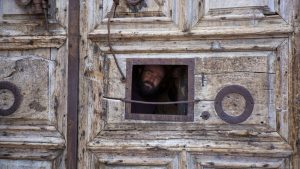Good Friday
In Jerusalem yesterday, a priest peers from the door of the Church of the Holy Sepulchre, where Christians believe Jesus was buried. Photo: Ariel Schalit/AP
Father Richard Rohr, Center for Action & Contemplation:
‘It is true that you are going to die, and yet “I am certain of this, neither death nor life, nothing that exists, nothing still to come, not any power, not any height nor depth, nor any created thing can ever come between us and the love of God” (Romans 8:38-39).
On Good Friday, we lament Jesus’ death while living in hope that death does not have the last word on our destiny. We are born with a longing, desire, and deep hope that this thing called life could somehow last forever. It is a premonition from something eternal that is already within us. Some would call it the soul. Christians would call it the indwelling presence of God. It is God within us that makes us desire and seek God.
Yes, we are going to die, but we have already been given a kind of inner guarantee and promise right now that death is not final—and it takes the form of love. Deep in the heart and psyche, love, both human and divine, connotes something eternal and gratuitous, and it does so in a deeply mysterious and compelling way. We are seeing this now in simple acts of love in this time of crisis, such as people volunteering to make masks and deliver food, or people cheering hospital workers arriving for their shift. Isn’t it amazing how a small act of love or gratitude can imprint a deeper knowing on our soul?
The crucifixion of Jesus is the preeminent example of God’s love reaching out to us. It is at the same moment the worst and best thing in human history. The Franciscans, led by John Duns Scotus (1266-1308), even claimed that instead of a “necessary sacrifice,” the cross was a freely chosen revelation of Total Love on God’s part.
In so doing, they reversed the engines of almost all world religion up to that point, which assumed that we had to spill blood to get to a distant and demanding God.
On the cross, the Franciscans believed, God was “spilling blood” to reach out to us! This is a sea change in consciousness. The cross, instead of being a transaction, was seen as a dramatic demonstration of God’s outpouring love, meant to utterly shock the heart and turn it back toward trust and love of the Creator.
I believe that the cross is an image for our own time, and every time: we are invited to gaze upon the image of the crucified Jesus to soften our hearts toward all suffering.
Amidst the devastating spread of COVID-19, the cross beckons us to what we would call “grief work,” holding the mystery of pain, looking right at it, and learning from it. With softened hearts, God leads us to an uncanny and newfound compassion and understanding.’

Leave a Reply